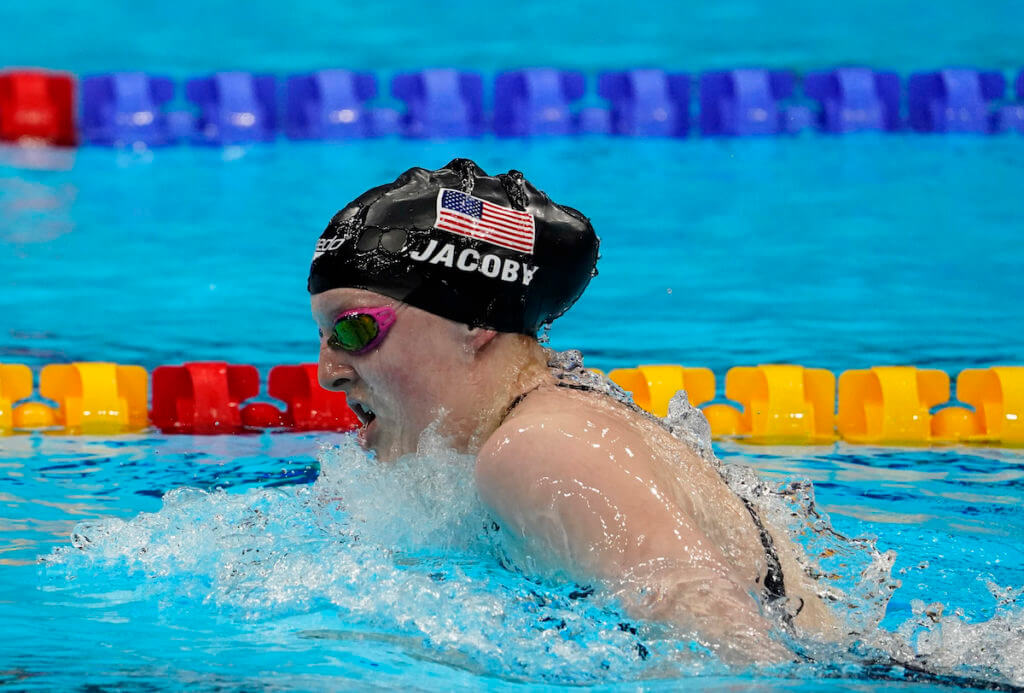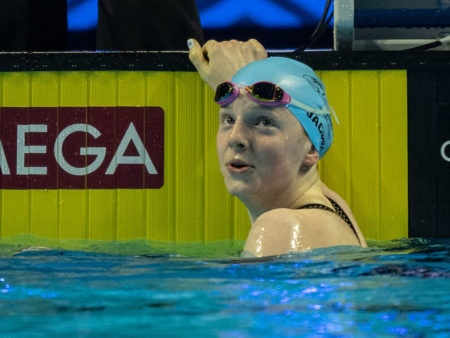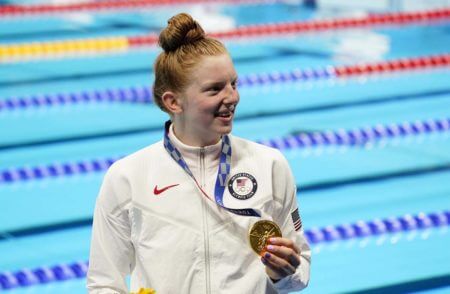Meghan O’Leary, Coach of Lydia Jacoby: ‘Alaska Swimming Won That Medal, Too’

Editorial content for the 2021 Tokyo Olympic Games coverage is sponsored by GMX7.
See full event coverage. Follow GMX7 on Instagram at @GMX7training #gmx7

Meghan O’Leary, Coach of Lydia Jacoby: ‘Alaska Swimming Won That Medal, Too’
In June, Lydia Jacoby made history as the first swimmer from Alaska to qualify for an Olympic swim team. It was at that moment Meghan O’Leary, Jacoby’s coach at the Seward Tsunami Swim Club, realized that Jacoby had a chance to accomplish something really special a month later, something as special as Olympic gold.
“That’s when I knew there was a chance,” O’Leary said. “She’s a competitor, and that race at Trials was close enough to spark even more confidence.”
In the women’s 100 breaststroke final at the U.S. Olympic Trials, Jacoby was in fifth place at the halfway point, only to close in 34.34, quicker than anyone in the field. The 17-year-old from Seward, Alaska, has a distinctive breaststroke, without the aggressive up-and-down body motion that characterizes most of the world’s best and a breaststroke kick that is the envy of everyone watching. She rode that to a spot on her first Olympic team. Jacoby touched second behind Lilly King that evening, her 1:05.28 good enough to send her to the Olympics as the second-fastest swimmer in the world for 2021.

Lydia Jacoby finished second in the women’s 100 breaststroke at the U.S. Olympic Trials — Photo Courtesy: Peter H. Bick
Within the previous year, Jacoby had stormed up the ranks just to give herself a chance at making the Olympic team. She won Junior Nationals in 2015 in 1:08.12, then improved her best time to 1:07.57 in November and then to 1:06.38 in April. That last swim was at the TYR Pro Swim Series in Mission Viejo, when she finished second to King and became an Olympic contender for the first time. The question then — and at basically every turn since — has been: How does a swimmer from Alaska get the training required to excel on the Olympic level?
According to O’Leary, they used video analysis of long course races to figure out stroke counts and tempos, and she would practice turns and finishes using that long course tempo. They used what resources were available and focused extensively on Jacoby’s strength training, which O’Leary’s co-head coach Solomon D’Amico focuses on. O’Leary credits Jacoby for her pinpoint focus on her training in the pool and her preparation outside of it, including sleep, nutrition and mental preparation.
That remarkable kick that was immediately one of the world’s best? “I never coached anything about her kick,” O’Leary said. “I just didn’t change it since I started coaching her when she was 10.”
But the challenges of becoming an Olympic champion in Alaska go well beyond not having an Olympic-sized pool. Jacoby’s home club actually shuts down in the summer, so she typically travels several hours to swim at the Northern Lights Swim Club with coach Ben Kitchen. That is an everyday reality for the Alaskan swimming community, not just once-in-a-generation Olympic hopefuls.
“We have to travel pretty far for competitions,” O’Leary said. “Our team is at least two hours from any other swimming pool. Some communities with swim clubs aren’t connected by roads, and we have to fly or take ferries for competitions.”
O’Leary said Alaska’s LSC offers travel assistance to help get to meets elsewhere in Alaska or even in California or Hawaii. “One thing that I think is great about Alaska swimming and Alaska in general is that it’s a small place, despite its large size, and we look out for one another.” But no other pools within two hours? That kind of inconvenience just to get to a regular swim meet? Those are obstacles no other swimming community in the U.S. has to overcome.
And yet, that’s the setting from which Jacoby emerged to become an Olympic gold medalist.

Lydia Jacoby poses with her gold medal from the women’s 100 breaststroke at the Tokyo Olympics — Photo Courtesy: Rob Schumacher/USA Today Sports
O’Leary remembers watching the moment when Jacoby touched third at the halfway point in her first Olympic final but then stormed past defending Olympic champion King and Olympic-record holder and top seed Tatjana Schoenmaker to earn a gold medal nobody saw coming.
After Jacoby finished, she turned around to face the scoreboard, her face breaking into total shock as Schoenmaker and then King swam over to help the new champion celebrate. Jacoby seemed almost unsure how to react. She called the moment “insane.” Thousands of miles away, at the big Jacoby watch party in Seward, her coach shared in her emotions.
“Watching it was very emotional. There was a strange combination of shock and joy and validation,” O’Leary said. “It’s hard to explain the feeling. Professionally, I’m not sure what it means. I still consider myself a young coach. I’m only 30, and I never swam at the level that she does. I’m learning the process along with her.”
And even in the immediate aftermath of Jacoby’s momentous accomplishment, O’Leary recognized how much that breakthrough might mean for the very non-traditional swimming community from which the two came. Jacoby could be a pioneer, one who will undoubtedly change swimming in Alaska forever.
“Alaska and Alaska swimming won that medal, too, in a way,” O’Leary said. “It brings a sense of pride. I think it will inspire new swimmers to join the sport here for our team and other teams in the state. It also raises the standard. Fast swimmers beget fast swimmers. I think we will see a trend in faster and faster times on average for the swimmers around our state.”




